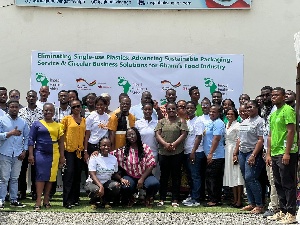- Home - News
- Elections 2024
- News Archive
- Crime & Punishment
- Politics
- Regional
- Editorial
- Health
- Ghanaians Abroad
- Tabloid
- Africa
- Religion
- Photo Archives
- Press Release
General News of Thursday, 5 June 2025
Source: www.ghanawebbers.com
World Environment Day 2025: Stakeholders call for urgent policy reforms on single-use plastics
Ghana is making progress in reducing plastic pollution. This effort involves collaboration and commitment from the private sector.
A key part of this initiative is the Voluntary Pact to Reduce Single-Use Plastics. This business-led program was co-designed by Plastic Punch, a local NGO. It partners with Ghanaian businesses and receives support from German Development Cooperation's Go Circular program.
The Ministry of Environment, Science, and Technology (MEST) and the Environmental Protection Authority (EPA) back this initiative.
The Voluntary Pact includes supermarkets, retail businesses, banks, and markets across Ghana. They aim to cut single-use plastics (SUP) by 50% by 2030.
Inspired by successful practices from Germany, Kenya, and Rwanda, the Pact focuses on changing consumer behavior.
One major campaign under this initiative is “Bag the Habit of Single-Use Plastic.” It encourages Ghanaians to refuse, reduce, and reuse plastic bags.
This campaign supports existing advocacy efforts. It emphasizes that change begins with everyday choices.
To celebrate World Environment Day in 2025, stakeholders highlighted the need for policy reforms. They stressed business leadership and public engagement regarding single-use plastics.
Hobson Agyapong from EPA stated that single-use plastics threaten our environment. He noted that collaboration helps connect regulators with civil society and businesses for practical solutions.
One pilot measure is a 50-pesewa fee on plastic bags. This aims to encourage consumers to use reusable alternatives.
Richmond Quarcoo from Plastic Punch explained that charging for plastic bags nudges consumers toward better choices about waste.
Supermarkets involved in the Voluntary Pact are launching the Bag the Habit campaign. These include SNEDA Supermarket, All Needs Supermarket (Legon), and Neha Supermarket.
While supermarkets contribute significantly to plastic waste, other sectors also play a role. The food and catering industry is a major contributor as well.
To tackle this issue, the Go Circular Project recently completed its Business Development Programme for Circular SMEs with Impact Footprints Africa.
This initiative helps small and medium-sized enterprises in food services reduce their reliance on single-use plastics.
Participating SMEs are adopting sustainable practices like wrapping waakye in leaves or using paper bags instead of plastic ones.
From Accra’s supermarkets to local vendors, a national shift is happening. As Ghana changes its approach to plastic use, the Voluntary Pact represents a growing movement towards a cleaner future.











